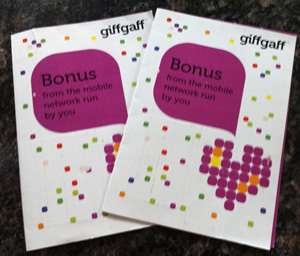Marketing
Good Marketing, Bad Marketing
It's not often you see really good and really bad examples of marketing from the same company in the same week – but Giffgaff here in the UK have done just that.
Giffgaff are a sim only mobile phone company. You buy their sim, stick it in your own phone, and you get an absolutely tremendous deal: £10 a month for 250 minutes, unlimited texts and unlimited data is their core deal.
So since they're offering what looks like the very best deal on the market, you'd think their advertising would focus on this benefit.
No, of course not.
Giffgaff has sponsored a bunch of TV shows, including The Big Bang Theory which is where I first came across them. Yeah, I admit it, I watch geek comedy.
Their great idea for their sponsorship was to show a little image before the show and during every ad break that says…wait for it..”Giffgaff – the mobile phone network that's run by you”.
Whaaat?
No mention of them having the best tariffs out there, with unlimited data.
Just that their network is apparently run by me and you.
I'm not even sure what that means. But it doesn't sound that good. I don't want to run a mobile network – feels like hard work. I just want a great deal.
Apparently, the “run by you” thing is because they do a lot of their customer support through user forums where subscribers help each other out. So overheads are lower, and so they can afford to give you better deals.
OK. So that makes sense. But I couldn't possibly have guessed that from the 10 seconds of “The mobile phone network that's run by you”.
They've fallen into classic bad marketing. They've tried to be clever instead of effective. They've focused on the feature, not the benefit. And they've made me work too hard to figure out what I'd be getting.
After months of me watching these promos and doing nothing, I actually ended up switching to them. Not because of the ad – but because of word of mouth. Someone told me what their actual tariffs were and said they'd had a great experience with them.
So I checked it out, switched. And then saw an example of great marketing from them.
About a week or so after joining, I got these through the post.
They're Giffgaff sim cards I can give to my friends. When they activate them, they get £5 of free credit and I get £5 of credit on my number too.
It's a brilliant example of referral marketing done well.
They got the timing right: a couple of weeks in, I've had enough time to be sure the network performs well and I get good reception. I can recommend them with confidence. But it's not so long that the novelty and delight at the savings has worn off.
They got the incentive right: they recognised that we're not all purely “what's in it for me” motivated. We like to do good things for our friends. The incentive is £5 for me – but more importantly, £5 free calls for the person I give the sim to. So I don't feel all sleazy for recommending something where only I get the benefit. The person I recommend it to benefits too.
And they made it easy for me to make the recommendation. I don't have to go to a website to order an extra sim. Or fill in all sorts of details. Or wait for it to be delivered. It's there in my hand right now. I just have to give it to the person I'm recommending it to. Easy. And quick.
I just wonder who gets paid the most in Giffgaff. The genius who came up with the referral giveaway. Or the idiot “creative” who came up with the clever-but-useless advert? Sadly, I suspect the latter.
More importantly – what can you learn?
Firstly, when it comes to advertising: don't forget the basics. Focus on benefits not features. And don't fall into the “cleverness” trap.
And for referrals, make it easy for someone to refer you – don't make them do all the hard work. Use Linkedin to identify exactly who you'd like a referral to rather than having them figure it out. Ask for a referral when they're confident in your capabilities and are feeling the benefits of what you've done for them.
And harness altruism, not just self interest. Help them see how the person they'll be referring you to will benefit. Create a free report or gift of some sort they can give from you to the person they refer
you to that will make them feel like they're doing the person a favour, not just recommending someone to them.
And keep an eye out yourself for good and bad marketing to learn from!
Ian Brodie
https://www.ianbrodie.comIan Brodie is the best-selling author of Email Persuasion and the creator of Unsnooze Your Inbox - *the* guide to crafting engaging emails and newsletters that captivate your audience, build authority and generate more sales.
